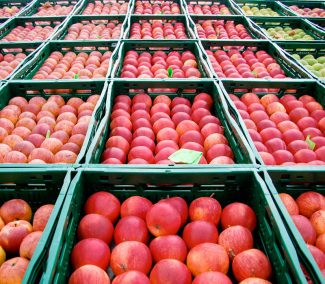Chicago (August 22, 2019)—Apple exports for the 2018 crop were down 27 percent from the previous year, said the U.S. Apple Association today at the organization’s annual Crop and Outlook Marketing Conference. The value of apple exports fell by 22 percent, from $1.1 billion in 2017 to $854 million for the 2018 crop.
Amid growing trade tensions and escalating tariffs from top export countries, the overall farm gate income for U.S. apple growers fell 16 percent, or $588 million, from 2017 to 2018. The Agriculture Department’s Trade Mitigation Program purchased $83 million of fresh apples according to Agricultural Marketing Service officials.
“The past 12 months have seen trade quickly emerge as an issue that’s immediately impacted our bottom line,” said USApple Chair Kaari Stannard, president of New York Apple Sales and a grower. “Mexico and Canada purchase nearly half of our apple exports, good for a contribution of nearly half a billion dollars per year toward a positive trade balance. We need—we must have—continued free access to those markets.”
According to an Aug. 12 estimate by USDA, 253.1 million bushels for the 2019 apple crop would be the ninth largest since the government department began reporting apple production in the 1940s, reinforcing the need for access to top apple markets.
“With exports and income down significantly, and a large harvest already beginning, these numbers express the dire need to resolve the trade conflicts as soon as possible,” said USApple President and CEO Jim Bair. “There is not a day to delay.”
The industry continued the trend to adapt to consumer preferences by increasing production of Gala and Honeycrisp, which is expected to overtake production of Granny Smith with the 2019 crop. If the current trend continues into 2020, said USApple Director of Regulatory and Industry Affairs Mark Seetin, Honeycrisp could even move ahead of Fuji to third place in overall production. The 2019 top five produced apple varieties, based upon the USDA Aug. 1 estimate, are 1) Gala 2) Red Delicious 3) Fuji 4) Honeycrisp, and 5) Granny Smith.
“Red Delicious, while still an important apple variety, particularly for the export market, continues to lose share to other varieties,” said Seetin. After more than 75 years as the top grown apple in the U.S., Red Delicious was dethroned last year by Gala.
-30-








